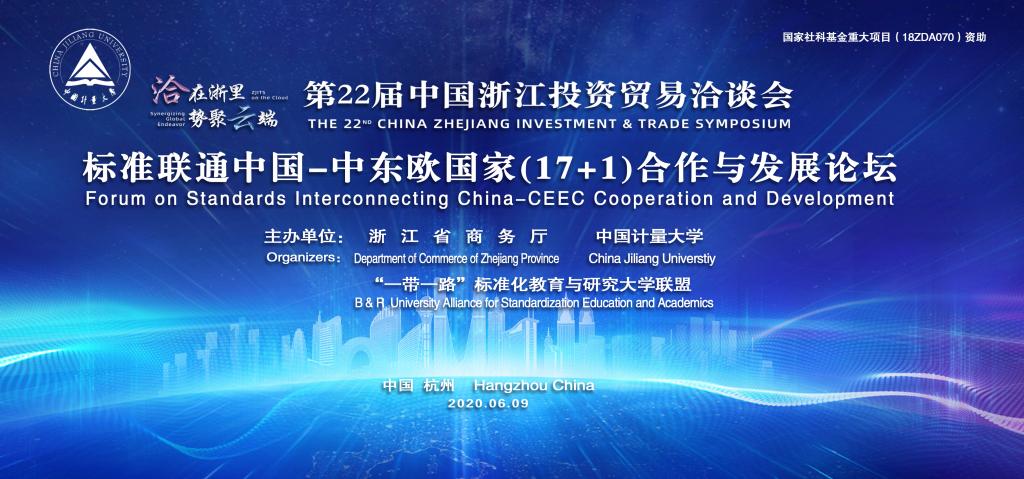Standards are achievements of human civilization and the language that connects the world. Nowadays, with economic globalization, standards are important means for national governance and international economic, trade, cultural and technological exchanges.

On June 9, as a sub-forum of “The 22nd China Zhejiang Investment & Trade Symposium”, the “Forum on Standards Interconnecting China-CEEC Cooperation and Development” was held at China Jiliang University. This forum was co-organized by Department of Commerce of Zhejiang Province, China Jiliang University, B&R University Alliance for Standardization Education and Academics, and B&R Regional Standardization Research Center. The forum was held both on site and online, and more than 1000 people watched the live streaming forum online.


With policy coordination, infrastructure connectivity, unimpeded trade, financial integration and people-to-people bonds, countries along the Belt and Road have witnessed increasingly frequent economic and trade exchanges and expanding cooperation. The prosperity of economic and trade exchanges depends on the recognition of quality in countries and regions along the Belt and Road, and support of the national quality and technology foundation such as standards, metrology, certification and accreditation.

Tang Xiaogang, Deputy Director-General of Department of Commerce of Zhejiang Province pointed out that Zhejiang is now actively promoting the building of "17+1" Economic and Trade Cooperation Zone and is committed to speeding up economic and trade cooperation and exchanges with central and eastern European countries (CEEC). In 2019, trade between Zhejiang and CEEC totaled more than 84 billion yuan. To further deepen cooperation and exchanges with CEEC, we cannot make it without accreditation of quality and standards in CEEC.

Song Mingshun, President of China Jiliang University, also Chair of B&R University Alliance for Standardization Education and Academics pointed out that in the face of the COVID-19 outbreak this year, standards have been applied to the prevention and control of the pandemic and resumption of work and production such as the quality assurance of medical products, the development of health code standards, and the stability of market trading order, making a unique contribution to achieving significant strategic results in fighting against the pandemic.

This forum connected experts and scholars in economics and standardization from the Czech Republic, Slovakia, Serbia, and Poland, to deliver keynote speeches online, discussing standards helping with fighting the pandemic and the resumption of order of production and life and promoting cooperation and development between China and CEEC. Three foreign experts are from member universities of B&R University Alliance for Standardization Education and Academics, which was co-initiated by our university in 2018.

Petr Budinsky, Vice Rector of University of Finance and Administration in Prague, the Czech Republic, delivered a keynote speech titled Impacts of COVID-19 on global economy, including the Czech Republic. He introduced government measures and procedures against COVID-19 pandemic in the Czech Republic and estimated the GDP growth of the major economies including the Czech Republic in 2020 and 2021.


Professor Ivana Mijatovic from University of Belgrade in Serbia delivered a keynote speech titled Education about standardization – before and after pandemic crises. She pointed out that before pandemic crises, many global initiatives related to education about standardization advocate that standardization needs to find its place in formal higher education and lifelong learning globally in order to create future professionals who can use their knowledge and skills related to standards and standardization for technology transfer, economic growth and global sustainability. However, the crises that arose due to the pandemic and the need for rapid economic and social recovery indicated different roles and purposes of standardization education.

Professor Zheng Suli from China Jiliang University analyzed 3 cases of good standardization practice in Zhejiang province: QR traffic light to help stop COVID-19, Service and management specification for home-based care, and “Maximum One Visit" reform in Zhejiang. She pointed out that good standardization practice needs the leadership of the government, innovative technology integration, key stakeholder engagement and continuous improvement and adaptation.

Professor Marta Orviska from Matej Bel University in Slovakia delivered a keynote speech titled The role of standards for global development: opportunities and challenges. She discussed the importance of standards for global development, fulfilling the UN Agenda 2030 sustainable development goals, the role of standards in implementing new technologies and innovations, such as AI and robotics, but also their role in online trade, highlighting the importance of international accreditation of university programs with applied standards as a guarantee of the training to enter global markets.

Professor Malgorzata Osinska delivered a keynote speech titled Cultural differences between Poland and China: Business as (non) usual. She analyzed cultural differences between Poland and China and discussed the impacts of cultural differences on business between the two countries. Bearing the cultural differences between Poland and China in mind, enterprises in the two countries may be able to communicate better and do more business with each other.
“We will cooperate with universities in the University Alliance and partnership institutions to jointly respond to the epidemic through scientific research, personnel exchanges, standards development and promotion, so as to make greater contributions to educational cooperation, personnel exchanges, cultural exchanges, trade cooperation and economic and social development between China and CEEC”, said President Song Mingshun.
(Written by Wang Yimi / Photo by Dai Jie / Translated by Zhu Tiantian)

